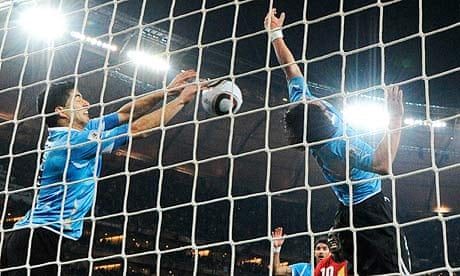A little over a year ago the Premier League whirligig stopped for a moment while everyone watched the slow‑motion non‑handshake between John Terry and Wayne Bridge at Stamford Bridge. The repeat fixture takes placeon Sunday, and there will be considerable surprise if Roberto Mancini's erratic Manchester City ambush Chelsea with a 4-2 away win.
There will be no repeat of the handshake snub, since Bridge's career was less robust than Chelsea's title challenge and the full-back is now on loan to West Ham. But anyone looking for a similar frisson in the otherwise rather pointless exercise of teams shaking hands before matches should keep their eye on Sunderland v Liverpool, when Asamoah Gyan and Luis Suárez make contact for the first time since the dramatic events of the World Cup quarter-final in Johannesburg last July. Both have promised to shake hands and put old history behind them, though Gyan sneakily let slip that Suárez is still a hated man in Ghana.
If you need a quick refresher, the quarter-final went to extra time and in the final minute of the added half-hour, Suarez, of Uruguay, standing on his own goalline, kept out a header from Ghana's Dominic Adiyiah with his hand. Suarez was dismissed, only for Gyan to strike the bar with the resultant penalty, the last kick of the game. The tie then went into a shoot-out, and though Gyan was brave enough to take Ghana's first penalty and score, just moments after the miss that could have put his team through, his colleagues were not as composed and the last African side went out.
The feeling that it was an unsatisfactory way to leave a World Cup was only strengthened by footage of Suárez celebrating on the sidelines. The striker was duly suspended for the semi-final against Holland, though had Uruguay won he would have been available for the final, and in addition to the other refereeing travesties it beamed around the globe the World Cup would have been embarrassed by an act of foul play being seen to bring a reward.
Even now there will be people rushing to protest that Suárez's reaction was an instinctive one, that he was punished by dismissal and that had Gyan scored the first penalty ample justice would have been done, for nine months after the event opinion is still sharply divided. The position outlined above is perfectly reasonable, though it is also true that there is a certain amount of pressure on a penalty taker in the last minute of extra time in a World Cup quarter-final, that a certain match-winning goal was denied by illegal means and that by dint of being sent off in the closing seconds, Uruguay were never disadvantaged by the loss of Suárez on the night. While he was unavailable to take a penalty in the shoot-out, at no time were the South Americans obliged to play with 10 men.
The Portuguese referee took the only option open to him and players who handle shots on the line can always argue they have committed one of the game's lesser crimes, obeying an almost involuntary instinct to prevent a goal without premeditation, though a combination of Gyan's miss and Suárez's gloating left a bitter aftertaste, and not just in African mouths. When Harry Kewell handled on the line earlier in the World Cup, also against Ghana, he escaped vilification because he had not moved his arm as much, but also because Gyan scored the penalty and Australia played for more than an hour with 10 men. Most thought that fair and there was even a suggestion Kewell had been harshly treated. Some felt a penalty without a red card would have sufficed, even though the referee would have been in trouble for such a fudge. The situation is somewhat different in the last minute of extra time in a knockout round.
The ideal solution at Soccer City would have been for the referee to decide that a certain winner had been illegally prevented, and award a penalty goal, not a penalty kick, as well as dismissing the offender. No such sanction at present exists, which is why Suárez was able to add insult to injury by talking of a miracle and boasting he made the best save of the tournament. Despite Fifa huffing and puffing, he still played in the third‑place play-off against Germany.
From Fifa's own mission statement: "Winning is without value if victory has been achieved unfairly or dishonestly." Fair play to the organisation that backs Fair Play, however. They weren't going to stand for snoods.
Terry critics should fear Captain Cole
Surely the whole point of Fabio Capello is to make his own decisions and, if the England manager wants John Terry back as permanent captain, it is entirely his prerogative.
The pragmatic Italian is not one to hold a grudge, to be swayed by others or to let an errant but still useful player be hung out to dry for longer than is necessary and that sort of bold, independent thinking is believed to be why the FA hired him at such expense in the first place.
Capello must be wondering why he was praised for his firmness in ditching Terry last year yet is now under attack for being equally ruthless with a palpably unfit Rio Ferdinand. A terrible World Cup showing is the answer.
Capello may be locked in a loveless marriage with the FA, to use the current buzz-phrase, but he is contesting an acrimonious, mud-slinging divorce with the more strident prints. And it is all for little reason since he will be gone by next summer, leaving whoever takes over to make his own choice of England captain.
There is no real issue here and those who believe Terry has not been sufficiently humiliated or must be punished indefinitely should be careful what they wish for. The other outstanding candidate – in terms of age, experience, enthusiasm, reliability and unfailing fitness – is Ashley Cole.
